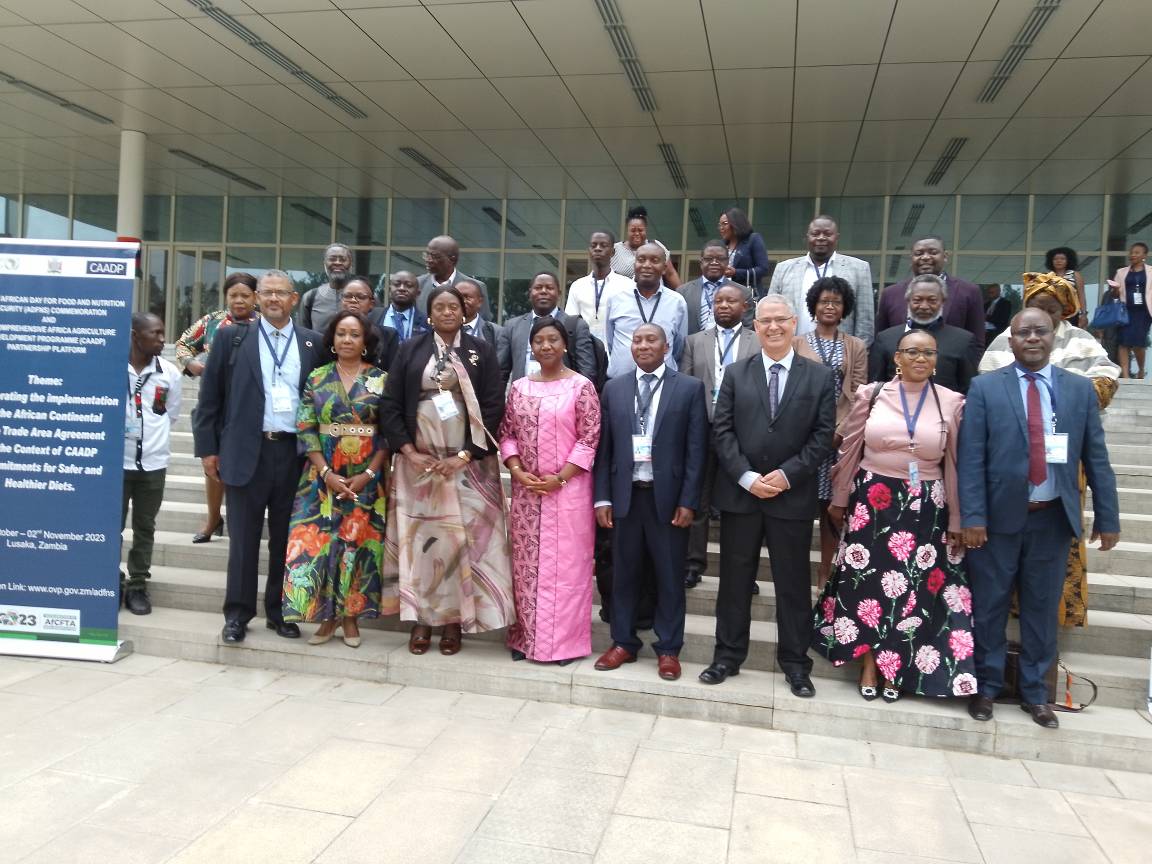|
Getting your Trinity Audio player ready...
|
There is an urgent need to accelerate the implementation of the Comprehensive Africa Agriculture Development Programme (CAADP), a continental framework for agricultural transformation and agriculture-led growth strategy to achieve ambitious targets on food and nutrition security as outlined in the Malabo Declaration.
These were sentiments by the African Union Development Agency (AUDA-NEPAD)’s Director of Agriculture, Food Security and Environmental Sustainability today during the first day of the 14th Africa Day for Food and Nutrition Security (ADFNS) Commemoration and the 19th Comprehensive Africa Agriculture Development Programme (CAADP) Partnership Platform running from the 30th of October to the 2nd of November 2023 in Lusaka, Zambia.
The expert said issues of food and nutrition security are foremost on the development agenda as a continent. Tied to this call, she said building resilient and inclusive food systems for Africa is the most pressing challenge of our generation since more than 250 million Africans are hungry.
Africa is still emerging from the devastation of the Covid pandemic, and the ongoing Ukraine/Russia war. These are some of the major shocks that have devastated the continent’s fragile food systems in recent years. Unfortunately, due to the lagged effects of these shocks, hunger, and malnutrition on the continent is likely to worsen in the coming years.
This picture is compounded by a deepening climate crisis that threatens food production systems, natural ecosystems that are critical to the resilience of our food systems, key infrastructure, and the lives and health of millions of our people. Our current investments in adaptation and resilience building are still way short of what is required to win the fight against climate change. These are only a few of the challenges facing our food systems.
“To be clear, Africa faces a dangerous cocktail of mutually reinforcing crises that are converging into a ‘perfect storm’. Unless we act with urgency and common purpose, our continent faces a dire future.
“The crises we face today are a stuck reminder of the urgent need to accelerate the implementation of CAADP, our continental framework for agricultural transformation and agriculture-led growth strategy to achieve our ambitious targets on food and nutrition security as outlined in the Malabo declaration. A ‘quantum leap’ in our efforts is required to ensure that all Africans have access to safe, nutritious, and affordable food, produced sustainably by our African farmers who also have to make a decent living out of their hard work,” Mrs Fotabong said.
Ms. Suze Filippini, the FAO Representative to Zambia said in 2014, African leaders adopted the Malabo Declaration to accelerate structural reform, committing themselves to ensure food and nutrition security through agriculture-led growth and tripling intra-African trade in agricultural commodities and services by 2025.
She said that commitment underscores the perceived critical importance of trade in achieving food security on the continent.
“In fact, trade contributes to Africa’s food security by enhancing the availability, access, utilization, and stability of agrifood supplies. It contributes to the resilience of agrifood systems, underpinning the stability of supply by compensating for shortfalls in domestic production. Furthermore, trade can promote better nutrition by allowing access to a wide and diverse range of foods necessary for healthy diets, Ms. Filippini said.
In light of this, the African Continental Free Trade Area (AfCFTA) presents an opportunity to enhance inclusive investment and trade in agricultural products with a view to increasing output, moderating food prices, and building resilience to external shocks.
The AfCFTA represents a large captive continental market of over one billion consumers and presents attractive opportunities for smallholder farmers, women, youth, and other business operators in the agrifood value chain. However, when not aligned with the national objective of promoting healthy diets, it can also bring harmful effects, via the availability of cheap, energy-dense foods with minimal nutritional value, which then lead to increased obesity and diet-related Non-Communicable Diseases.
Dr.Hameed Nuru, Director for World Food Proigramme Africa Union Global Office and Representative for African Union Commission and United Nations Economic Commission for Africa presented on “Success Stories and Policy Lessons on The Intersection Between Nutrition, Food Security and Trade.”






